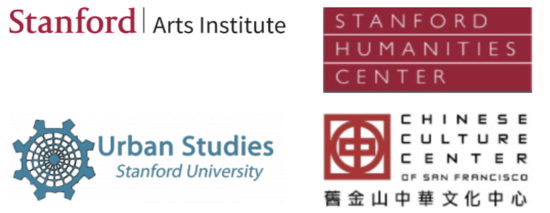The Right to the Creative City is a series of public discussions exploring the politics of urban futures, co-organized by Andrew Herscher and Johanna Taylor. Drawing on political, aesthetic, and technological perspectives, each discussion brings work on the creative city into relation with struggles for the right to the city.
Towards Arts of Co-liberation
May 18, 6:30pm
Reception to follow
41 Ross
Chinese Culture Center of SF
41 Ross Alley, San Francisco, CA
How do artists engaging with urban communities around issues of displacement, disenfranchisement, and urban development open up prospects for new alliances and solidarities? Can art practices open possibilities for co-liberation?
Inspired by the exhibition New Urban Legend: Resistance of Space curated by Ziying Duan at the Chinese Culture Center’s 41 Ross, Towards Arts of Co-liberation will discuss the ways in which art can imagine and construct political relationships across lines of difference. The projects in the exhibition explore urban issues by engaging local communities in San Francisco, Hong Kong, and the Pearl River Delta in China. This discussion will include a set of responses to the exhibition and conversation with the exhibition’s curators and participating artists.
Participants
Abby Chen, Artistic Director and Curator, Chinese Culture Center of SF
Ziying Duan, Assistant Curator, Chinese Culture Center of SF
Marci Kwon, Assistant Professor, Art History, Stanford University
Yongfeng Ma, artist
Wei Leng Tay, curator
Weston Teruya, artist
Michelle Wong, curator
Organized in collaboration with Chinese Culture Center of San Francisco
Urban Technopolitics
May 25, 4pm
Reception to follow
Stanford Humanities Center
424 Santa Teresa Street
Stanford, CA
The “creativity” in the “creative city” is often understood as an outcome of the “innovative,” “disruptive,” or “change-making” capacity of technological solutions to urban problems. And yet, these innovations, disruptions, and changes tend to unfold within existing political, economic, and social contexts: consumer marketplaces, neoliberal economies, and democratic governments, from the liberal to the authoritarian, are taken as fixed givens rather than targets of technological exploration and transformation. How can technology be brought to bear on problems of urban exclusion, inequality, and injustice? How can rifts between technologists, the communities they seek to serve, and other communities of expertise be bridged? What are the common points of engagement between new technology and communities whose survival is threatened? Could indigenous, subaltern, decolonizing, or anti-capitalist forms of creativity reanimate and transform the creativity of technology? What do activists demand in this space of contestation?
Participants
Tiffany Andrews, Code for America
Leslie Dreyer, Artist and Anti-Eviction Organizer
Stefano Funk, Anti-Eviction Mapping Project
Eric Rogers, Embassy Network
Preeti Talwi, Google X
Questions: Contact Rebecca Struch (rstruch [at] stanford.edu)

